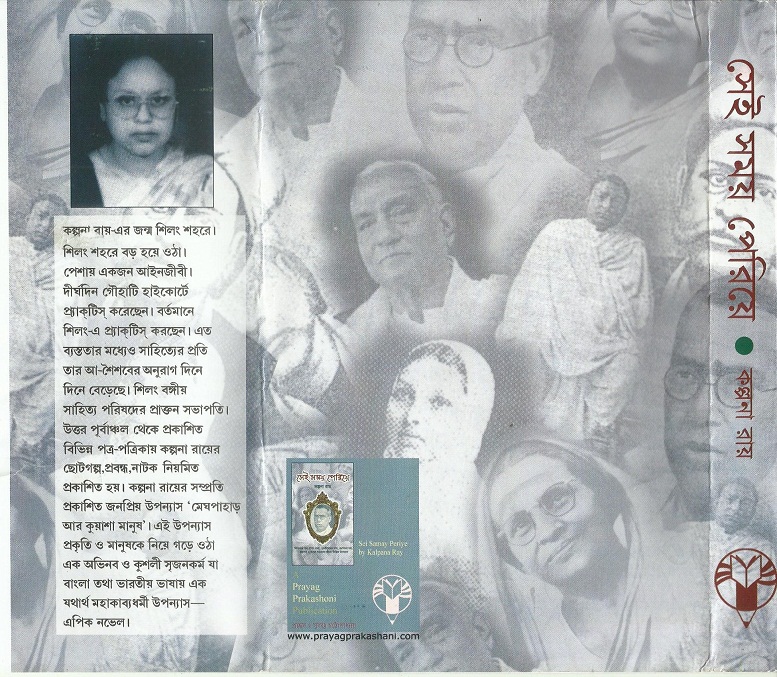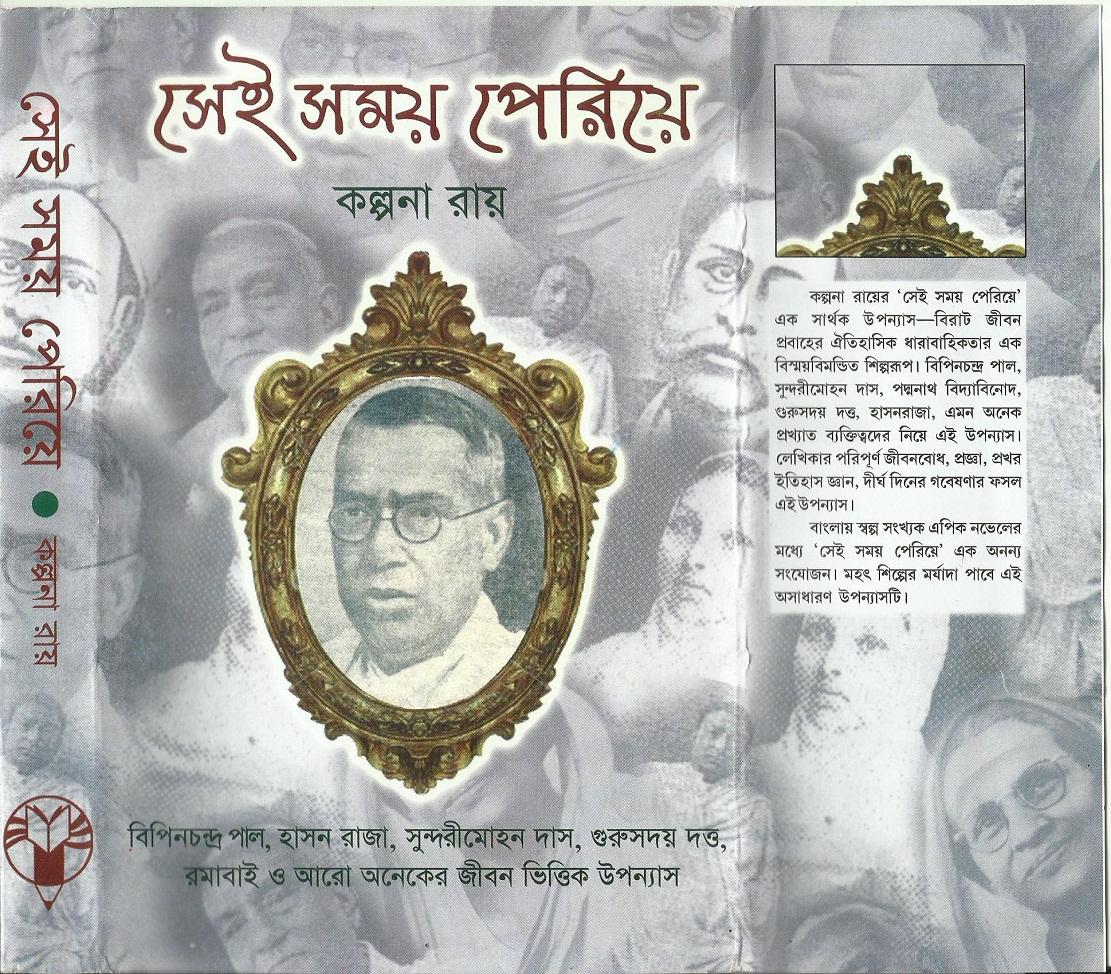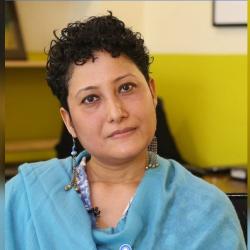Award winning Shillong based author, Kalpana Roy’s ‘Sei Somoy Perie’ (Beyond that period) covers a period of Indian independent movement in the then Bengal, which very soon spread over the entire Indian sub-continent. The book received the prestigious Narsingdas Bengali Prize for the best book in Bengali in Arts / Science subject from the University of Delhi in 2014. The central character of the book – published in April, 2012 – is the renowned independent movement activist from this part of the country, Bipin Chandra Pal, who was born in a small village in Sylhet (now in Bangladesh) district of undivided Bengal. The book is primarily a biographical novel on the life of this great freedom fighter and his contemporaries – who forms some of the famous people from Sylhet region and other parts of India.
Two boys were born in two separate villages in the district of Sylhet – Sundari Mohan Das and Bipin Chandra Pal – who were to become bosom friends later and remain so till their last breath. Bipin’s father was a reputed legal practitioner and among other languages knew French well. He wanted his son to study French but Bipin was interested in English, instead. His friend, Sundari Mohan Das was a very good student. Though Bipin was not as studious as him but was good in English. Sundari Mohan later went to Calcutta (now Kolkata) to study medicine and became a famous gynecologist there. In the course of time, during the period of practicing as a physician, he saw the plight of women in the country from a very close range and realized the necessity of their education.
Bipin on the other hand took admission in Presidency College, Calcutta whose Bengali accent was unlike the Bengalees there. Meanwhile, the Sylhet district was cut out of Bengal and annexed to Assam. There was lot of protest from all corners but nothing could be done to forestall this move. Of course this division brought some benefits too, since Assam was a backward state and Sylhet became a part of this state. Being a student of a backward region, Bipin was entitled to a scholarship of Rs 10 per month, which made it easier for him to go to Calcutta for further study.

The duo – Bipin and Sundari – started getting attracted to the Brahmo Samaj in Calcutta particularly to the speeches by its leader, Keshab Chandra Sen. Bipin never felt any inclination to Brahmoism but he liked the eloquence of Keshab and wished one day he himself would be an orator like him. The turning point was when both friends attended a meeting meant for students where Surendranath Banerjee was delivering a lecture. Bipin was very much moved after listening to him and was now sure that his destiny has brought him to Calcutta to become an orator like Banerjee.
Around that time, Bipin’s mother and his younger sister died. In search of solace, amidst pain and sorrow, Bipin renegade to the Brahmo leader. Here he met Sibnath Sastry, a brilliant student of Calcutta University and a poet, too. But this move did not please his father and had its repercussion. After knowing about his son’s initiation to Brahmoism deviating from the Vaishnavite order by which the family swears, his father disowned him and stopped funding his education in Calcutta, which forced Bipin to end his study. Though only son, yet his father never forgave him and remarried again to beget a son who would inherit the family properties and for the rituals after his death, as required to be performed by a son in every Hindu families.
The author has elaborately discussed about the student life of Bipin in Calcutta and his introduction to the cultural milieu in the book. Along with the life story of Bipin, stories of many other characters have been interwoven nicely. The writer narrates beautifully how in course of time Bipin turned into a fierce orator after converting to Brahmoism along with his friend Sundari. This conversion though does not receive approval of his father and deprived him of every help for his stay in Calcutta including inheriting his father’s properties, poverty soon gripped him and he started teaching in various schools in India but due to strong sense of self esteem he could never continue in a school for long. During that time the emergence of nationalist movement in Bengal was at its peak. The Nationalist School was established in Sylhet around the same time where Bipin began teaching after relocating to his hometown from Calcutta. In addition, he was also appointed editor of the newspaper ‘Paridashak’ allowing him to engage in various social activities in Sylhet town. Prior to that, his father urged him in a letter to return to the Vaishnavite order and his village. But due to illness, Bipin could not meet his father and returned to Calcutta. Later he learnt about his father’s will debarring him from the family property. Meanwhile, Sundari completed his medical studies in Calcutta and both friends along with some other like minded people formed the ‘Sylheti Sammelan’ with the main motto being education of women in India, though in course of time it turned into a social organization for the Sylhetis of Bengal. Sundari’s contribution for spread of women education in India would always be remembered with high regards.
Few pages in the book have been attributed to Ramabai, an educated Maharashtrian lady who was made a member of Sylheti Sammelan in order to encourage women education in Sylhet. A Brahmin and a widow, she remarried a Kayastha gentleman of Sylhet, which was not accepted by the then society there and was soon out casted. After her husband’s death, she left for Maharashtra with her daughter. Later she went to Europe and returned back with higher education, experience and also with monitory affluence and established a women welfare organization in Pune.
Together with the main story there are numerous interwoven sub-stories of characters who were contemporaries to Bipin like William Carey, the preacher of Christianity in Sreerampore in Bengal and his assistant Krishna Chandra Pal, who later wrote the Bible in Khasi using Bengali script, rising of U Tirot Sing against the British rule and battle with Jaintia king Raja Rajendra Singh, surrender of the Raja and his death in British captivity. Brief stories of Hasan Raja, Gurusaday Dutta, Sister Nivedita, Gandhiji’s approval of Khilafat Movement, Achyut Chandra Choudhury, formation of Kamrup Anusandhan Samity by Padmanath Saraswati, Santi Babaji, religious discourse between Swami Vivekananda and Padmanath Bhattacharjee of Sylhet find due mention in the book. The stories of each of these individuals around the main protagonist give readers the clear sense of the independent movement and the nostalgia. She has intrinsically stirred this feeling in her book.
Bipin was granted scholarship by the British and a foreign Unitarian Association for higher study at the new Manchester College in Oxford for two years. But he was to bear the travelling expenses which were later arranged by his friends and well wishers. In England, he kept himself always busy delivering lectures in various gatherings. In America too – he visited many places and delivered lectures and simultaneously continued his writings, too. As he moved in the states and cities of both these countries meeting many famous personalities, he also realized every moment that he was not from a free and independent country. He felt that unless India attains freedom, Indians will never get due esteem in foreign countries. This has ignited the fire of independence in him and to fuel the cause he introduced a weekly newspaper, New India, with the aim of igniting the suppressed nation with new ideas and thoughts. He vehemently criticized the division of Bengal by Curzon.
This well researched novel by the author actually sets a chronological presentation of these historical facts as she said, “It is in fact a tragic novel and this tragedy is centered on Bipin.” The author further added that his strong political contradiction with Mahatma Gandhi was the root cause of this tragedy. She mentions that at one time Bipin even expressed his strong differences with Gandhi’s way of non-cooperation movement and pan Islamism. Bipin’s political ideologues differed with Gandhi’s but the latter’s influence could not deter his spirit and hence he preferred a self exile from the political scenario of India. The author writes, “There was a time, when Bipin was vehemently opposed to the various lines of activities undertaken or suggested by Gandhi towards non-cooperation movement. He (Gandhi) wrote against pan Islamic movement which has turned out to be true in present day situation.”
Bipin’s vision was clearly expressed in his disagreement with the pan Islamism that religion is above the state, since he was fully aware about the danger lurking behind this move. But he was sincerely concerned about the education in Muslim society and maintained that pan Islamism should ideally emphasize on education as professed in Islamic religious texts because he believed that every Indian irrespective of their differences in religious belief, caste or creed, have the right to education.
Bipin had his own take on the idea of non-cooperation movement, too. He believed that economic boycott was the best weapon to fight against British imperialism. Basically, Britishers are business community and hence an attack on their economy would be the right thing to do. Just by rejecting foreign goods, as sought by Gandhi, would not do as he was in favour of withdrawal of Indian capital invested in British enterprises. He thought it would directly strike at the very root of the British economy and pave way for the success of the non-cooperation movement. For the country’s independence, he declared that only moral pressure, as followed by Gandhi, would never succeed in driving the British out of India but in case of a war in Europe and internal mutiny in Great Britain threatening their own existence, only in that event the Britishers might move out of India.
However, though he went through intense hardships in his life but never compromised with his ideologies. Before his death, he returned to his village and renegade to the Vaishnavite order, inheriting his family properties. The book is a historical storehouse and deserves an English translation since the materials are hugely useful for undertaking any research based work by students and writers.
- 14944 reads








Add new comment